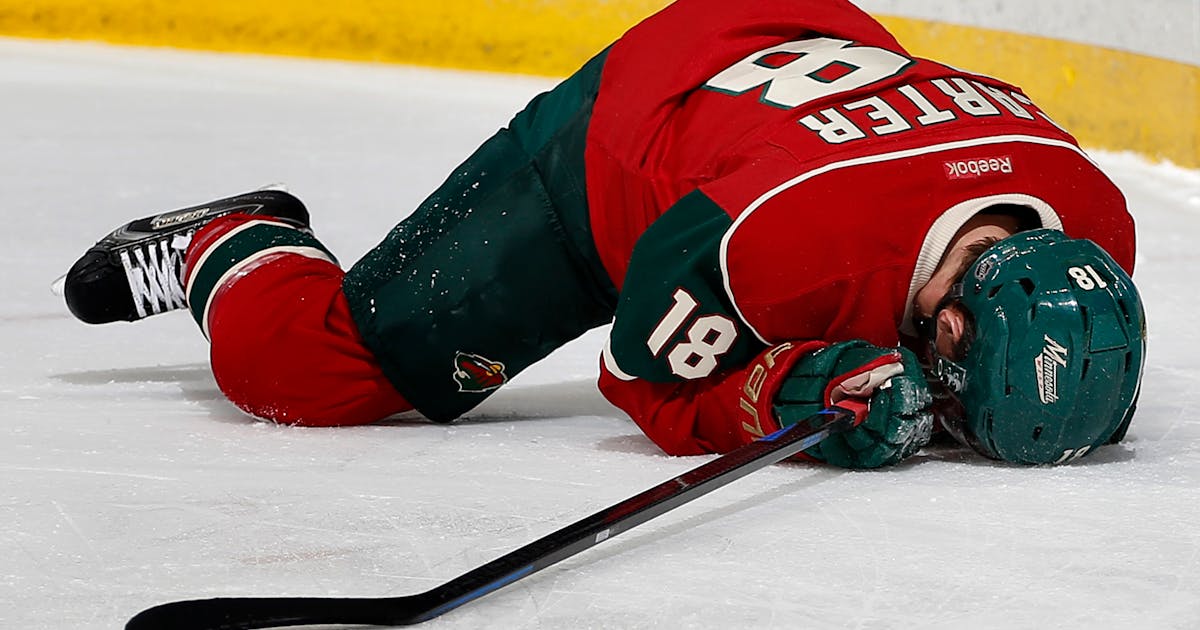Marcus Foligno suffered a nasty-looking knee-on-knee hit that forced him off the ice in the Wild's final regular season game Friday. The alternate captain feared the worst after losing feeling in his knee accompanied by a tingling sensation down his leg.
Back on the ice less than 48 hours later to test his leg in practice, Foligno declared himself ready to play Monday night in Game 1 of the first round series against the St. Louis Blues.
Not that anyone should be surprised.
"It's the playoffs," he said. "That's my biggest answer. It'd feel wrong sitting out."
Foligno is wearing hockey's version of a badge of honor. The NHL playoffs are a testament to a player's ability, and willingness, to withstand ailing and sometimes broken body parts in the pursuit of the Stanley Cup.
The playoffs represent a grueling exercise in which players grow beards, lose teeth and have their bodies pummeled like a punching bag. The lucky ones are those who don't require surgery once the ride is over.
"It's worth it," says former Wild winger Ryan Carter, who played in 46 career postseason games between three organizations. "There's playing hurt and playing injured. In the playoffs, that moves more toward your accepting to play injured."
Teams typically don't discuss injuries during the playoffs, other than to denote that a player has an upper-body injury or lower-body injury. Behind the scenes, players dig deep to get themselves ready to play the next game.
"It's fun, right?" Wild coach Dean Evason said. "You want to feel the pain, the bumps and bruises. It means that you've done what you're supposed to do."
Fun? Yeah, hockey players are just a little … different.
Former Wild defenseman Willie Mitchell suffered a fractured cheekbone and torn ligament in his wrist during the remarkable 2003 playoff run. He kept playing.
"Hockey players are known for being tough; I would say hockey players are kind of stupid sometimes too," Mitchell told me in 2020. "That was one for me. Tough and stupid."
He missed only a few shifts after a deflected puck struck him in the face in Game 7 of the Colorado series. Surgery the following morning left him with 56 stitches on the side of his head. Mitchell had his helmet modified so he could play against Vancouver the next series.
A hit by Vancouver's Todd Bertuzzi along the boards in Game 4 "tore my ligament right off," Mitchell said, and left him unable to dress himself or pass or shoot the puck without searing pain during morning skate before Game 5.
"We never even asked him if he was playing," teammate Wes Walz said.
Shoulder injuries are routine in hockey as players get hit in awkward positions, which occasionally makes getting dressed after games challenging.
"That's why you've got teammates," Walz joked.
Carter suffered a groin injury one postseason that had to be taped up "tighter than a snare drum" so he could skate. Every morning he woke up and asked himself a question: Am I going to be able to do this?
He found a way.
"You get through the game," he said, "and you're like, 'I made it. I made it. We live to play another day.'"
Walz found the mental grind of the playoffs to be just as taxing. He remembers weighing himself during the '03 postseason. He weighed 187 pounds at the start. When he jumped on the scale the morning of Game 1 against Anaheim in the Western Conference Final, he was surprised to see that he was down to 178 pounds.
"I was eating like a pig," he said.
His parents came to town for that series. His mother was concerned when she saw his appearance.
"You look sick, are you OK?" she asked him.
Walz believes his weight loss largely was due to playoff stress.
The ultimate prize means that much.
"If you win a Stanley Cup in your life, it's like you've made it," Walz said. "Unfortunately, I've never had that opportunity."
True, but that doesn't mean he didn't have a successful career.
"But I never won a Stanley Cup," Walz said. "Honestly, every year I watch the Stanley Cup get raised over the players' heads and every year I think about how incredible that would have been."
That pinnacle moment doesn't happen without first enduring a large dose of physical pain. Hockey players find gratification in that.

